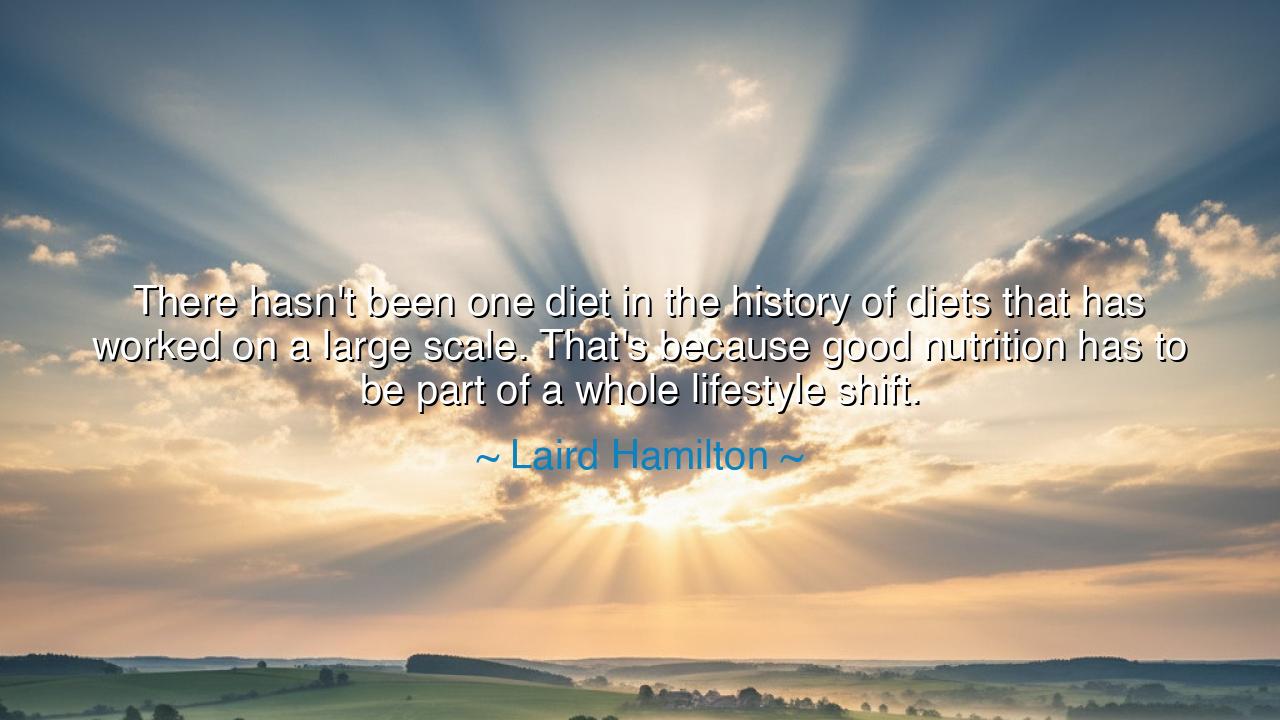
There hasn't been one diet in the history of diets that has
There hasn't been one diet in the history of diets that has worked on a large scale. That's because good nutrition has to be part of a whole lifestyle shift.






"There hasn't been one diet in the history of diets that has worked on a large scale. That's because good nutrition has to be part of a whole lifestyle shift." These words, spoken by Laird Hamilton, strike at the heart of a profound truth that transcends the fleeting trends of modern society. The pursuit of health and well-being is not found in temporary fixes or restrictive diets, but in the deeper, more lasting changes that come from a shift in lifestyle. Hamilton’s words are a reflection of ancient wisdom—that true nourishment and vitality come from an integrated approach to life, where diet, movement, mind, and spirit are all nurtured in balance.
In the ancient world, philosophers such as Socrates and Plato understood that the pursuit of a virtuous and healthy life was not about short-term solutions, but about a constant, holistic commitment to living well. Socrates himself would often speak of the harmony between body and mind, teaching that a man must train not only his body, but also his spirit and intellect. A balanced approach to life—one that took into account the whole person, their habits, their thoughts, and their actions—was the path to true health. Hamilton echoes this ancient understanding, asserting that nutrition alone, without a complete transformation of lifestyle, will never yield lasting results.
Consider the ancient Greeks, who, in their devotion to the Olympic Games, trained not just their bodies, but their minds as well. The athletes who competed in those grand contests did not follow restrictive diets as we understand them today; rather, they adhered to principles of balance—eating the foods that fueled them, training their bodies rigorously, and nurturing their minds with philosophy and culture. Their lives were holistic, where each part of their being supported the others. Hamilton’s insight about good nutrition is rooted in this ancient understanding: it is not enough to simply eat well; we must also move, think, and live in ways that honor our whole being.
The ancient Romans also understood this connection between lifestyle and health. In his writings, the philosopher and statesman Cicero extolled the virtues of a balanced life, where intellectual pursuits, physical activity, and even leisure were intertwined. For the Romans, health was a reflection of one’s daily habits—a life well-lived was one where all parts were in balance, where no extreme was allowed to overtake the whole. This is the essence of what Hamilton is expressing: that diets, no matter how well-intentioned, will fail if they are not part of a larger, more comprehensive approach to living well.
Consider also the story of Hippocrates, the father of modern medicine, who understood that health was not just about the food one consumed but about the habits, environment, and mental clarity that supported the body’s needs. Hippocrates famously said, "Let food be thy medicine, and let medicine be thy food," but he also understood that a person’s lifestyle, their sleep, their exercise, and their relationships all played critical roles in determining one’s overall health. A person could not expect to be healthy by simply changing what they ate without addressing the rest of their life. Hamilton’s wisdom aligns closely with this idea, for he suggests that good nutrition is only one piece of the puzzle—it must be integrated into a larger shift in how we live.
The lesson in Hamilton’s words is one of wholeness. True health is not achieved through the singular focus on any one part of our being, but through the integration of body, mind, and spirit. Diet alone is insufficient; it is only through a lifestyle shift, where we consider how we nourish every aspect of ourselves, that we can achieve lasting vitality and well-being. The ancients knew this, and they built their lives around this truth. To change our lives, we must start by changing the way we live as a whole—not just through fleeting dietary changes, but through the ongoing practice of balance and mindful living.
In practical terms, this means that we must move beyond the allure of fad diets or quick fixes. Hamilton’s advice calls us to focus on sustainable habits—eating nourishing food, moving our bodies with intention, and cultivating a positive mindset. It calls us to embrace a lifestyle that promotes health in every aspect: our relationships, our work, our rest, and our mental clarity. In doing so, we create a life where health is not something we pursue intermittently, but something we live and embody every day.
So, let us take the wisdom of Laird Hamilton and the ancients into our lives. Let us recognize that the pursuit of health is not a goal, but a lifelong practice. Just as the Greeks and Romans understood, and just as Hippocrates and Cicero taught, true vitality comes when we commit to a holistic lifestyle, where our bodies, minds, and spirits are all in harmony. Let us not seek the quick path, but the steady, balanced journey of well-being. Through mindful eating, movement, and balanced living, we will create a foundation for a life of lasting health and fulfillment.






AAdministratorAdministrator
Welcome, honored guests. Please leave a comment, we will respond soon